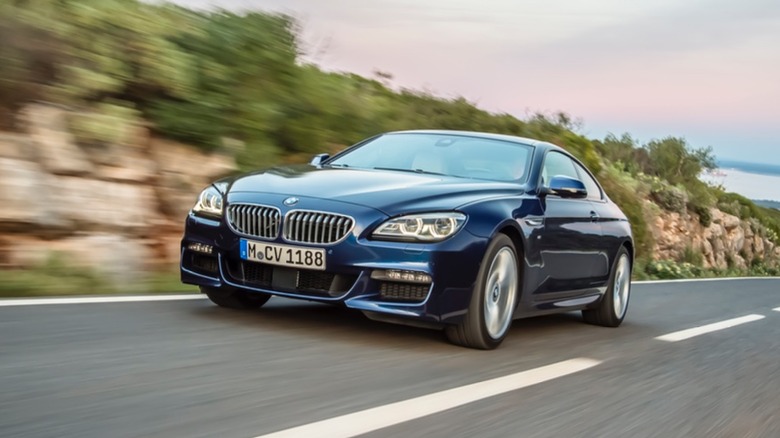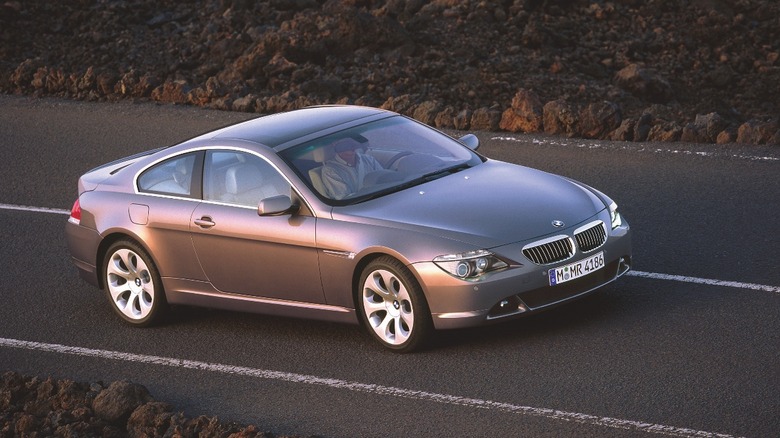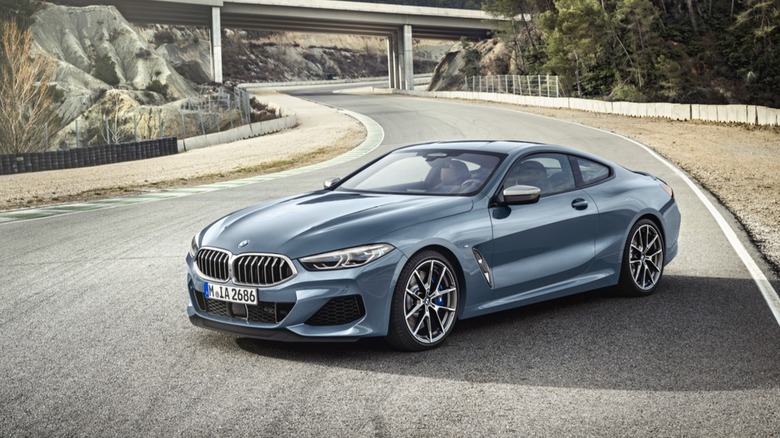Here's Why BMW Discontinued The 6 Series
The BMW 6 Series has a storied reputation as a showstopper, initially released in 1976 as a replacement for the timeless E9 grand-tourer. The E9 proved that there was room in the BMW lineup for a sleek and stylish GT car, and the 6 Series was a continuation of that ethos. BMW didn't disappoint with the E24 generation 6 Series, from either a styling or performance standpoint. In the 13 years that the E24 6 Series was offered globally, it received numerous revisions and refinements that made it more powerful, better looking, and a better driver's car. However, the E31 8 Series took the "shark nose" E24's spot as BMW's grand tourer in 1989, leaving the 6 Series in limbo for over a decade.
Four years after the E31 disappeared in 1999, the 6 Series rose from the dead. The second generation E63/E64 6 Series was based on the chassis of the E60 5 Series and was offered as either a coupe or convertible. The E63/E64 is an often overlooked model in BMW's history, mainly because it wasn't the best car for any occasion. However, the E63 M6 is a memorable exception to that, with a screaming F1-derived 5.0L V10 under the hood that made it an icon for its sound alone.
When the E63/E64 was discontinued in 2011, it was immediately replaced by the sharp and modernized F06 6 Series. The four-door coupe F06 marked the 6 Series' departure from a strict coupe/convertible body style. The large 5-door liftback G32 6 Series Gran Turismo was also added in 2017, serving as the last 6 Series entry before it was discontinued worldwide in 2023.
Sales figures were abysmal
In 1976, BMW had enough evidence from Neue Klasse and E9 sales to bet on the grand tourer body style being successful. Compact and sporty Neue Klass cars like the 2002 and 2000 CS coupe were BMW's saving grace in the 1960s. While the E3 and E9 didn't sell quite as well as most of the Neue Klasse sedans, there was still enough consumer interest following BMW's motorsport success to be financially viable in the mid-1970s.
When the E24 6 Series was released in 1976, it was one of the only GT cars that was sporty, affordable, and performance-oriented. The E24 beat the Porsche 928 to showroom floors by two years and was close in price to the less agile Mercedes 450SLC. As a result, the E24 sold 86,216 units between 1976 and 1989. However, the second generation E63/E64 6 Series arrived in the U.S. in 2003 to fierce competition from Mercedes, Bentley, and Aston Martin. Sales numbers for the 6 Series began slipping in 2007, with BMW only selling 19,626 total units compared to 21,947 the year before, while BMW sold 230,845 5 Series in 2007.
Sales didn't improve with the third-generation F06 6 Series. Initially, things looked good when the F06 launched in 2011 and sold 9,392 units compared to only 5,848 units of the previous year's model. However, sales were dire at the end of the 6 Series' production run, with 237 German deliveries in 2023.
The 8 Series replaced it ... again
While the 6 Series' terrible sales figures were certainly a massive reason for the model's early departure, BMW also had another grand tourer in the pipeline. In the same way that the E31 8 Series replaced the outgoing E24 6 Series in 1989, the G14 8 Series represented the final nail in the coffin for the 6 Series when it was announced in 2018. The 8 Series was everything that the 6 Series tried to be and more.
Although the 8 Series technically replaced the 6 Series, it actually found a niche a weight class above what the previous 6 was targeting. You can see that from the 8 Series $90,800 base MSRP. That is nearly $14,000 more expensive than the base 640i Gran Coupe sold for when it was new. BMW also dropped 'Gran' out of the 8 Series Coupe's branding, hinting at its performance-focused design philosophy.
Since 2018, the 8 Series has had an iffy start to its production cycle. A sport-oriented luxury car is never going to sell as well as BMW's more civilian options like the 3 Series or 5 Series and, while still selling better than the 6 Series at the end of its run, the 8 Series seems to be having sales issues of its own. A combination of poor advertising, stiff competition, and non-competitive pricing is setting the 8 Series up for a similar fate to the 6 Series.


